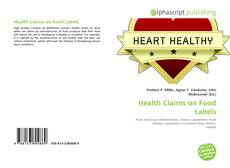38 health claims on food labels australia
Health and nutrition claims | NSW Food Authority Health and nutrition content claims are voluntary statements made by food businesses on labels and in advertising about the health benefits of the food and need to meet the criteria set out in the Food Standards Code. Health claims refer to a relationship between a food and health. About food labels | Health and wellbeing - Queensland It covers: Country of origin labelling. Fish labelling. GM food labelling. Health advisory labels on alcoholic beverages. Health claims (nutrition, health and related claims) Ingredient lists and percentage labelling. Labelling for religious, environmental, animal welfare and other consumer value issues.
Nutrition, health and related claims - Food Standards Health claims You can only base health claims on food-health relationships that have been substantiated according to Standard 1.2.7. All health claims must be supported by scientific evidence to the same degree of certainty, whether they are pre-approved by us or self-substantiated by food businesses. General level health claims
Health claims on food labels australia
What Are The Labelling and Packaging Laws in Australia? Key Takeaways. Australia has strict labelling and packaging laws. Failing to comply with these laws can result in damage to your business and customers. As a general rule, all product packaging and labels must comply with the Australian Consumer Law (ACL). The ACL prohibits you from making misleading, deceptive, or false claims on your products ... Food standards and safety | Australian Government Department of Health ... Food standards in Australia. Keeping food safe and free from contamination is critical to public health. Australia has legislation and regulations to make sure local and imported food is safe to eat. manages food recalls. The Australian Government and state and territory governments enforce the standards, in line with their food legislation . Advertising Compliance and Food Packaging | LegalVision A health claim is one that states, suggests or implies that a food product or a certain property of the food product has, or may have, a health effect. Additionally, businesses can make health claims in their advertising, provided they comply with Commonwealth and state Food Standards legislation, and the claims are true.
Health claims on food labels australia. Health, nutrition and credence claims - food marketing and labelling ... The new Standard 1.2.7 - Nutrition, Health and Related Claims regulates the voluntary nutrition and health content claims that food businesses can make on labels and in advertising. The goal of the... PDF Getting Your Claims Right - Food Regulation All food businesses, including importers, in Australia and New Zealand must comply with Standard 1.2.7 when making nutrition content claims and health claims on food labels, in advertisements and in endorsements on food. The diagram on page 4 can help you consider whether Standard 1.2.7 applies to any claims made. Health-related claims on food labels in Australia: understanding ... Abstract Objective: Health and related claims on food labels can support consumer education initiatives that encourage purchase of healthier foods. A new food Standard on Nutrition, Health and Related Claims became law in January 2013. Implementation will need careful monitoring and enforcement to ensure that claims are truthful and have meaning. Nutrition content and health claims | Obesity Evidence Hub Australia's Food Standards Code sets out requirements for manufacturers wishing to make nutrient content claims ('low in fat') and health claims ('nuts contribute to heart health') on food labels. Fair trading laws in Australia also require that food labels do not misinform consumers through false, misleading or deceptive representations.
Food labels - Better Health Channel Health claims can also be made about a food product and relate to a nutrient or substance in a food, and its effect on health. There are 2 types of health claims: General level health claims - demonstrate the effect on a health function due to a nutrient or substance that is present in a food, such as 'calcium is good for bones'. Labelling Guidance - Australian Beverages Standard 1.2.7 sets out the rules for food businesses choosing to make nutrition content claims and health claims. Nutrition content claims are claims about the content of certain nutrients or substances in a food or beverage, such as 'low in fat' or 'good source of calcium'. These claims will need to meet certain criteria set out in the Standard. CHOICE guide to food labelling - Nutrition Nutrition content claims and health claims. In 2013, a new standard was introduced to regulate nutrient claims and health claims on food labels. Nutrition content claims are claims about the content of certain nutrients or substances in a food, such as 'low in fat' or 'good source of calcium'. These claims will need to meet certain ... Effective health warning labels | FARE Independent regulator Food Standards Australia New Zealand (FSANZ) developed and proposed an effective and evidence-based alcohol health warning label. This label was mandatory on all products and included the key features required to make the label effective, such as ensuring it had contrasting, identifiable colours (red, white and black).
Nutrition content claims and health claims - Food Standards Health claims are about the relationship between a food and health effects. All health claims must be supported by scientific evidence. Health claims are only permitted on foods that meet the Nutrient Profiling Scoring Criterion (NPSC). For example, the Standard doesn't allow health claims on foods higher in saturated fat, sugar or salt. How effective is food industry self-substantiation of food-health ... food standard 1.2.7 (the 'standard' hereafter) on nutrition, health and related claims permits three types of claim on food labels: (i) nutrition content claims highlighting the presence or absence of a nutrient, e.g. 'contains calcium'; (ii) general-level health claims stating, suggesting or implying that a food or property of that food has a … Organic claims | ACCC - Australian Competition and Consumer Commission An organic claim is any claim that describes a product as organic, or the ingredients used to make a product as organic. For example '100% organic', 'made using organic ingredients' or 'certified organic'. Products labelled as organic generally attract a premium price compared to those produced using artificial fertiliser, chemicals ... Label Claims for Food & Dietary Supplements | FDA Among the claims that can be used on food and dietary supplement labels are three categories of claims that are defined by statute and/or FDA regulations: health claims, nutrient content claims,...
Food labelling and packaging: Nutrition, health claims and supplement ... Nutrition labelling. You must follow nutrition labelling information rules for all pre-packed products unless both of the following apply: you're a small business with under 10 employees and a ...
Regulating health claims on food labels using nutrient profiling: what ... Proposed Australian regulation of claims on food labels includes requirements for products carrying a health claim to meet nutrient profiling criteria. This would not apply to nutrition content claims. The present study investigated the number and healthiness of products carrying claims and the impact of the proposed regulation. Design
In Pictures: 29 Foods With "Health Claims" That ... - Modern Health Monk #6 Chocolate Milk - "Vitamins A&D 37% Less Fat Than Whole Milk!" Ingredients? Okay, so there's actually milk in this. Good sign. Ingredient #2 = sugar. Ingredient #3-6 = cocoa mix science experiment & preservatives. Ingredient # 4 = Artificial flavors. De-lish. #7 Arizona Iced Tea "NO Calories!" At first we're like, "oh, sweet, no calories!?"
Policy Guideline on Nutrition, Health and Related Claims - Food Regulation (Endorsed 12 December 2003, revised on 28 May 2004 and again on 29 June 2018) On 12 December 2003 the Australia and New Zealand Ministerial Council (now the Australia and New Zealand Ministerial Forum on Food Regulation (Forum)) endorsed a nutrition, health and related claims policy guideline. On 28 May 2004 Ministers further considered the issue of biomarker maintenance claims.
Health and nutrition claims | NSW Food Authority Food labelling Health and nutrition claims Health and nutrition claims Health claims refer to a relationship between a food and it's health benefits, and are only permitted on foods that meet the nutrient profiling scoring criterion, meaning claims are restricted to foods which may support overall health.

All the food label health claims mean virtually nothing. In fact, such health claims on food ...
Food labelling - Health.vic Food labels are required by law to carry essential information so that consumers are informed of the nature and properties of foods prior to purchase -- this includes statements about the presence of allergenic ingredients that could lead to life-threatening allergic reactions in susceptible persons if the labelling information is not accurate.
Health Claims on Food claims on food products was introduced in Australia and New Zealand, in accordance with the fundamental nutrition principle that it is the total dietary balance that is important for health, and not individual foods claiming special medical benefits. 2. This prohibition policy has effectively prevented many
Regulating health claims on food labels using nutrient profiling: what ... Regulating health claims on food labels using nutrient profiling: what will the proposed standard mean in the Australian supermarket? The number of products carrying nutrition content claims that did not meet the nutrient profiling criteria suggests that comprehensive regulation is warranted.
How to read food labels | healthdirect In Australia, the law requires all manufactured foods to carry labels containing safety and nutrition information. This information helps you to make decisions about the food you buy and eat so you can follow a healthy diet. The label will tell you: the name of the product, describing accurately what it is the brand name
How to understand food labels | Eat For Health Sometimes labels will include nutrition content claims like 'low fat', 'reduced salt' or 'high fibre'. These claims can only be used if the food meets certain criteria. For example, with a 'good source of calcium' claim, the food must contain more than a set amount of calcium.
Advertising Compliance and Food Packaging | LegalVision A health claim is one that states, suggests or implies that a food product or a certain property of the food product has, or may have, a health effect. Additionally, businesses can make health claims in their advertising, provided they comply with Commonwealth and state Food Standards legislation, and the claims are true.
Food standards and safety | Australian Government Department of Health ... Food standards in Australia. Keeping food safe and free from contamination is critical to public health. Australia has legislation and regulations to make sure local and imported food is safe to eat. manages food recalls. The Australian Government and state and territory governments enforce the standards, in line with their food legislation .
What Are The Labelling and Packaging Laws in Australia? Key Takeaways. Australia has strict labelling and packaging laws. Failing to comply with these laws can result in damage to your business and customers. As a general rule, all product packaging and labels must comply with the Australian Consumer Law (ACL). The ACL prohibits you from making misleading, deceptive, or false claims on your products ...












Post a Comment for "38 health claims on food labels australia"